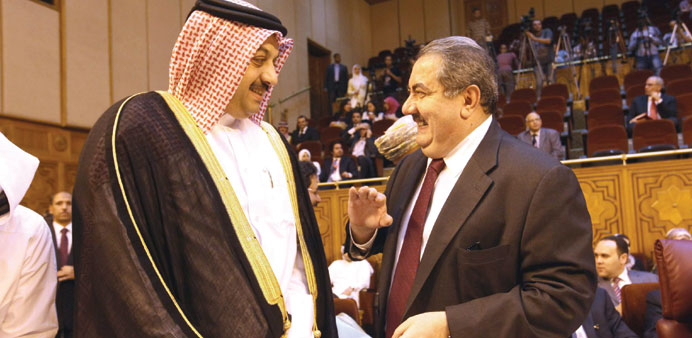Qatari Foreign Minister HE Dr Khalid bin Mohamed al-Attiyah speaks with Iraqi Foreign Minister Hoshyar Zebari before the Arab foreign ministers’ meeting in Cairo yesterday.
Reuters/Cairo
The Syrian opposition set terms yesterday for attending peace talks to end the Syrian civil war, in a move that throws the proposed conference into further confusion after the international envoy said there should be no preconditions.
The long-delayed talks - known as Geneva 2 - are meant to bring Syria’s warring sides to the negotiating table, but have been repeatedly delayed because of disputes between world powers, divisions among the opposition and irreconcilable positions of Assad and the rebels.
Syrian National Coalition president Ahmed Jarba said the opposition would not attend unless there was a clear timeframe for President Bashar al-Assad to leave power. He also said they could not accept the presence of Iran.
“We have decided not to enter Geneva talks unless it is with dignity, and unless there is a successful transfer of power with a specific timeframe, and without the occupier Iran at the negotiating table,” Jarba told an Arab League emergency meeting of foreign ministers in Cairo.
Lakhdar Brahimi, the international envoy for Syria, has said he hoped the conference could still be held in the next few weeks despite obstacles.
Though he had in the past said he thought Assad would not be part of a transitional government that Geneva 2 would attempt to install, he said on Friday that his opinions had no bearing on the parameters for the conference.
There is also discord among world powers over whether Iran should be invited to the talks. Tehran has said it is ready to come and Brahimi says the UN preferred that Iran attend but there had been no agreement on that yet.
A senior State Department official, speaking ahead of US Secretary of State John Kerry’s visit to Cairo and Riyadh, said the top US diplomat would make clear to the Saudis that Iran would not be welcome to attend the Syria peace talks unless it endorsed a past agreement that would see Assad give up power.
“Iran has not done that, and without that even we couldn’t consider the possibility of their participating,” the official added, stressing: “It is a question of just making sure they understand the details of how firm our position is.”
In Cairo, an Arab League draft communique called on the Syrian opposition to attend the conference.
“It (Arab League) decided to call on all sides of the Syrian opposition under the leadership of the Syrian National Coalition ... to accelerate the formation of the negotiating delegation”.
Jarba urged world powers to supply Syrians fighting Assad with weapons in the conflict that has so far claimed the lives of more than 100,000 people.
“We demand a clear decision on supplying the Syrian people with weapons to fight the hostility which gets worse hour by hour ... We guarantee that these weapons will not fall into the wrong hands.”
The growing influence of radical Islamist fighters and the disarray of rebel forces have made Western powers wary of intervening directly in the civil war by supplying weapons or troops.
While some rebel tensions stem from contrasting ideological outlooks, most infighting centres on rival claims over the control of territory, smuggling and other spoils of war.
Arab and Western officials have said that international powers were unlikely to meet their goal of holding the conference in November.
Even if Jarba were to attend the Geneva 2 meetings, he has no authority over the rebel brigades battling to overthrow Assad.
The main rebel brigades have announced their opposition to the conference if it does not result in Assad’s removal.

